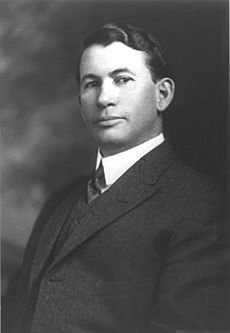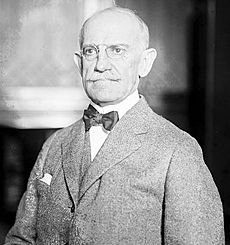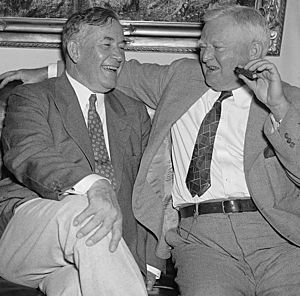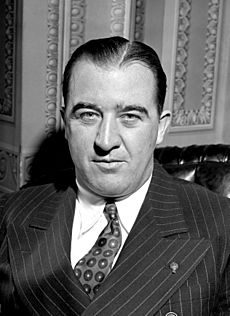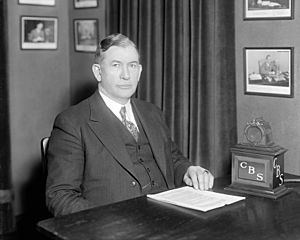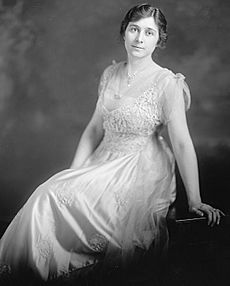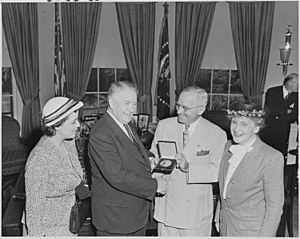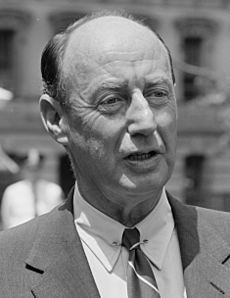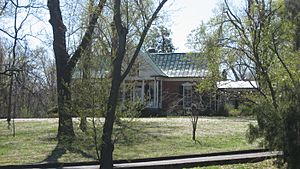Alben W. Barkley facts for kids
Quick facts for kids
Alben W. Barkley
|
|
|---|---|
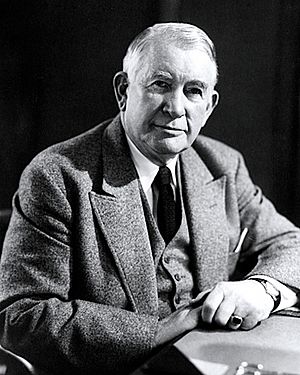
Official portrait, 1949
|
|
| 35th Vice President of the United States | |
| In office January 20, 1949 – January 20, 1953 |
|
| President | Harry S. Truman |
| Preceded by | Harry S. Truman |
| Succeeded by | Richard Nixon |
| Senate Majority Leader | |
| In office July 14, 1937 – January 3, 1947 |
|
| Deputy | J. Lister Hill Sherman Minton J. Hamilton Lewis |
| Preceded by | Joseph Taylor Robinson |
| Succeeded by | Wallace H. White |
| Senate Minority Leader | |
| In office January 3, 1947 – January 3, 1949 |
|
| Deputy | Scott W. Lucas |
| Preceded by | Wallace H. White |
| Succeeded by | Kenneth S. Wherry |
| Chair of the Senate Democratic Caucus | |
| In office July 14, 1937 – January 3, 1949 |
|
| Preceded by | Joseph Taylor Robinson |
| Succeeded by | Scott W. Lucas |
| United States Senator from Kentucky |
|
| In office January 3, 1955 – April 30, 1956 |
|
| Preceded by | John Sherman Cooper |
| Succeeded by | Robert Humphreys |
| In office March 4, 1927 – January 19, 1949 |
|
| Preceded by | Richard P. Ernst |
| Succeeded by | Garrett L. Withers |
| Member of the U.S. House of Representatives from Kentucky's 1st district |
|
| In office March 4, 1913 – March 3, 1927 |
|
| Preceded by | Ollie M. James |
| Succeeded by | William Voris Gregory |
| Personal details | |
| Born |
Willie Alben Barkley
November 24, 1877 Lowes, Kentucky, U.S. |
| Died | April 30, 1956 (aged 78) Lexington, Virginia, U.S. |
| Resting place | Mount Kenton Cemetery |
| Political party | Democratic |
| Spouses |
Dorothy Brower
(m. 1903; died 1947) |
| Children | 3 |
| Relatives | Stephen M. Truitt (grandson) |
| Education | Marvin College (BA) |
| Signature | |
Alben William Barkley (born November 24, 1877 – died April 30, 1956) was an American politician and lawyer from Kentucky. He served as the 35th Vice President from 1949 to 1953 under President Harry S. Truman.
Barkley started his political career in local offices in 1905. He was then elected to the U.S. House of Representatives in 1912. He served in both parts of Congress (the House and the Senate). He was a Democrat who supported new ideas. He backed President Woodrow Wilson's plans for the country.
Barkley lost a close election for Kentucky governor in 1923. In 1926, he became a U.S. Senator. In the Senate, he supported the New Deal programs. These programs aimed to help the country during the Great Depression. He became the Senate Majority Leader in 1937.
During World War II, Barkley became very important in shaping the country's laws. He resigned as leader once, but his fellow senators quickly re-elected him. He had a good relationship with Senator Harry S. Truman. Truman later became Vice President and then President.
In 1948, Truman chose Barkley as his running mate for Vice President. They won the election by surprise. As Vice President, Barkley was a key spokesperson for the Truman administration. He tried to run for president in 1952 but was considered too old. He retired, but then ran for Senate again in 1954 and won. Barkley died in 1956 while giving a speech.
Contents
Early Life and Education
Willie Alben Barkley was born on November 24, 1877. He was the oldest of eight children. His parents, John and Electa Barkley, were tenant farmers. They grew tobacco in Wheel, Kentucky. His family was very religious.
Barkley worked on his parents' farm. He went to school in Lowes, Kentucky, during the off-season. He didn't like his first name, Willie. So, he started using "Alben William" as soon as he could.
In 1892, Barkley went to Marvin College in Clinton. He got a scholarship by working as a janitor. He was good at debating. He earned his degree in 1897. His time at Marvin College made him become a Methodist.
After college, Barkley studied law. He worked as a law clerk in Paducah. He was allowed to use the law library as payment. He passed his law exams in 1901. He then started practicing law in Paducah.
Early Political Career
In 1904, Barkley decided to run for county attorney in McCracken County. He organized his own campaign. He gave many speeches and showed he was a good speaker. He won the election in 1905.
As county attorney, Barkley saved taxpayers money. He also went after officials who were misusing funds. Even his political opponents thought he did a good job. He became president of the State Association of County Attorneys.
In 1908, Barkley ran for county judge. This was a powerful position. The current judge decided not to run against him. So, Barkley won the election without a challenge.
As county judge, Barkley worked to reduce the county's debt. He also wanted to improve roads. He made changes to how the county managed its money. He helped make roads better for farmers to reach Paducah.
Serving in the U.S. House of Representatives (1913–1927)
In 1912, Barkley ran for a seat in the United States House of Representatives. He promised lower taxes and more rules for railroads. He won the election.
Barkley became more open to new ideas while working with President Woodrow Wilson. He supported Wilson's "New Freedom" plans. These plans included new laws about banking and trade. He also worked to end child labor.
Barkley supported the ban on alcohol sales in Washington, D.C. He also pushed for laws to stop using grain for alcohol during World War I. These actions made him more known across the country.
World War I and After
Barkley supported the U.S. staying neutral at first in World War I. But when Germany started attacking U.S. ships, he voted for war. He even thought about joining the army, but President Wilson asked him to stay in Congress.
After the war, Barkley supported the Treaty of Versailles. He also wanted the U.S. to join the League of Nations. However, these ideas did not pass in Congress.
In 1923, Barkley ran for governor of Kentucky. He promised "Christianity, Morality, and Good Government." He also wanted a tax on coal and to ban betting on horse races. He lost this election by a small number of votes. This was his only election loss.
Becoming a U.S. Senator (1927–1949)
In 1926, Barkley ran for the United States Senate. He ran against the Republican senator, Richard P. Ernst. Barkley highlighted his humble background. He also pointed out Ernst's unpopular views on veteran bonuses. Barkley won the election.
In the Senate, Barkley worked on important committees like Finance and Commerce. In 1928, some Democrats thought about him for Vice President. But the nomination went to Joseph T. Robinson.
Barkley disagreed with President Herbert Hoover's response to the Great Depression. He felt Hoover was not doing enough to help farmers. He also thought Hoover's tariffs (taxes on imported goods) would hurt the economy.
Leading the Senate Democrats
Barkley supported Franklin D. Roosevelt for president in 1932. He gave a powerful speech at the Democratic convention. He spoke about the need to end the Great Depression. He also called for the end of Prohibition (the ban on alcohol).
Barkley won his re-election to the Senate in 1932. This was the first time a Kentucky senator won a second term in the 20th century. Democrats gained control of the Senate. Barkley became the assistant to the Majority Leader, Joseph Robinson.
Together, Barkley and Robinson helped pass many New Deal laws. These laws aimed to help people and the economy during the Depression.
When Robinson died in 1937, Barkley ran to become the new Majority Leader. President Roosevelt supported Barkley. Barkley won by just one vote.
In 1938, Barkley faced a tough challenge for his Senate seat from Kentucky Governor Happy Chandler. Chandler was popular and younger. He tried to make Barkley seem old and out of touch.
President Roosevelt came to Kentucky to support Barkley. Barkley also worked very hard, giving many speeches every day. He won the election, showing that his age was not a problem for voters.
World War II and Disagreement with Roosevelt
As Majority Leader, Barkley helped pass important laws during World War II. He supported giving aid to the Allied Powers through the Lend-Lease Act. He also worked for the creation of the United Nations after the war.
Barkley and President Roosevelt had some disagreements. In 1944, Roosevelt vetoed a tax bill that Barkley and Congress had worked on. Roosevelt said the bill helped the rich, not the needy.
Barkley was very upset. He announced he would resign as Majority Leader. He said Roosevelt's words were an attack on Congress. Roosevelt sent a letter asking him to stay. But Barkley resigned anyway. Minutes later, his fellow senators unanimously re-elected him. This showed they supported Barkley and Congress.
Vice Presidency (1949–1953)
Barkley's first wife, Dorothy, passed away in 1947 after a long illness. To help pay for her care, Barkley gave many speeches. He was a very popular speaker.
In 1948, President Truman's popularity was low. Barkley gave a powerful speech at the Democratic convention. He energized the delegates. Truman then chose Barkley as his running mate for Vice President.
They won the election in a big upset. At 71, Barkley was the oldest person ever elected Vice President. His grandson suggested the nickname "Veep" for him. This nickname became popular.
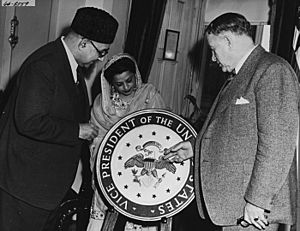
As Vice President, Barkley attended cabinet meetings. He also chaired the Senate Democratic Policy Committee. He was the main spokesperson for the Truman administration. He gave many speeches across the country.
In 1949, Barkley married Jane Hadley, a widow from St. Louis. Their wedding was televised nationally. Barkley is the only U.S. Vice President to marry while in office.
In 1951, Barkley received the Congressional Gold Medal. This honored his many years of service in Congress. President Truman surprised him by presenting the medal himself.
Campaign for President
In 1952, President Truman announced he would not seek re-election. Barkley decided to run for president. He was 74 years old.
To show he was not too old, Barkley walked many blocks to his campaign office. However, a group of labor leaders said he was too old. This made many states change their support for him.
On July 21, 1952, Barkley announced he was withdrawing from the race. He gave a farewell speech at the convention. He received a very long standing ovation. Adlai Stevenson II was nominated instead.
Later Years and Death (1953–1956)
After his term as Vice President ended in 1953, Barkley had eye surgery. He also worked on his life story.
In 1954, Barkley decided to run for Senate again. He ran against the Republican senator, John Sherman Cooper. Barkley campaigned very hard, showing he was still energetic. He won the election, giving Democrats a small lead in the Senate.
On April 30, 1956, Barkley gave a speech at a college event. He ended his speech by saying, "I'm glad to sit on the back row, for I would rather be a servant in the House of the Lord than to sit in the seats of the mighty." He then collapsed and died from a heart attack. He was 78 years old. He was buried in Mount Kenton Cemetery in Paducah.
Personal Life
Alben Barkley was a member of the Broadway Methodist Episcopal Church. He was also part of several social groups. He married Dorothy Brower in 1903. They had three children: David, Marion, and Laura Louise. Laura Louise married Douglas MacArthur II, a U.S. diplomat.
Legacy
Several places are named in Alben Barkley's honor.
- Barkley Dam and Lake Barkley in Kentucky were named after him in 1966.
- Barkley Regional Airport in Paducah is also named for him.
- Many of his personal items are on display at the historic Whitehaven house in Paducah.
See Also
 In Spanish: Alben W. Barkley para niños
In Spanish: Alben W. Barkley para niños
- List of United States Congress members who died in office (1950–99)


